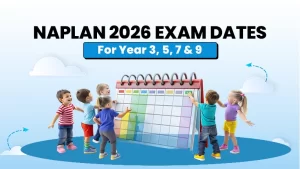NAPLAN Domains & Test Topics: What Parents Need to Know
The National Assessment Program – Literacy and Numeracy (NAPLAN) is a national assessment of Australian students in Years 3, 5, 7, and 9. It also assesses the basic literacy and numeracy competencies and assists parents, teachers, and policy makers to quantify the effects of education.
Although the majority of families are aware of the test dates and results, they are not familiar with the specific areas and subjects that NAPLAN addresses. These are important areas to understand to prepare well.
This blog will break down the four main test domains: Reading, Writing, Language Conventions, and Numeracy, with examples of the topics measured in each. The article is also related to our NAPLAN Test Guide 2026 to have an idea of the format, preparation, and results.
General Overview of NAPLAN Test Domains
NAPLAN consists of four major domains, which focus on particular literacy and numeracy skills:
- Reading
- Writing
- Spelling, Grammar, and Punctuation.
- Numeracy
These areas are similar in all years (3, 5, 7, and 9), although the level of difficulty and the intensity of the subjects become more challenging as the students advance.
Reading Domain
Reading assessment tests a student in their capacity to:
- Read, understand, and analyze written literature.
- Determine the major concepts and topics.
- Generalize meaning and deconstruct information.
Key Topics in Reading
- Understanding of the text of narrative (stories, novels, character growth).
- Informative writing (articles, reports, fact passages, etc.).
- Convincing materials (advertisement, opinion writing)
- Literary extracts and poetry.
- Determining the purpose and inspiration of a text.
- Decoding tables, graphs, and other visual materials.
Examples: A student can be provided with a text on environmental protection and asked to distinguish the central point, the purpose of the author, or the meaning of some words in a context.
Writing Domain
Writing assessment is a task where learners create a prolonged piece of writing within a given time.
Writing Tasks Generally Include:
- Narrative Writing: writing a story that has structure, characters, and setting.
- Persuasive Writing: attempting to make a position based on logic, evidence, and organization.
Key Topics in Writing
- The structure of the text: introduction, body, conclusion.
- Technologies of language: similes, metaphors, appeals to persuasion.
- Richness and precision of words: use of vocabulary.
- Spelling and grammar correctness.
- Cohesion and flow of ideas.
Example: Students can be requested to prepare a persuasive case on the topic of argumentation: is technology beneficial in learning, challenging their skills in writing a thesis and making a case.
The Language Conventions Domain
The language conventions domain is where linguistic rules that define a language reside. This test examines technical aspects of English, spelling, grammar, and punctuation.
Important Language Convention Issues
- Patterns of spelling: homophones, common words, and irregular spellings.
- Grammar: verbal forms, subject-verb agreement, and construction of the sentence.
- Punctuation marks: commas, apostrophes, quotation marks, and upper case.
- Construction of sentences: correcting mistakes and errors.
Example: A learner will have to fix the sentence:
“the dog runned across the feild.” → “The dog ran across the field.”
Numeracy Domain
The numeracy test assesses mathematical knowledge, fluency, problem-solving, and reasoning.
Key Topics in Numeracy
- Number and Algebra: ratios, equations, fractions, decimals.
- Measurement and Geometry: area, volume, angles, shapes.
- Statistics and Probability: graphs, data interpretation, events of chance.
- Problem-solving: word problems in multiple steps.
- Arithmetic operations involving the mind and estimation.
Example: A question might ask:
“If a recipe needs ¾ cup of sugar, how much sugar is needed for 4 recipes?”
Why Understanding Test Domains Matters
Most parents only concentrate on the test-taking techniques without the knowledge that the subjects are core curriculum skills. When preparing for these areas, students can:
- Develop strength in the weak points.
- Enhance quality in all areas of performance.
- Acquire skills that can be transferred outside of NAPLAN.
In the case of timing on when the tests will be held, our NAPLAN 2026 Exam Dates and Prep Guide provides a schedule to coordinate when the studies are conducted with the exams.
Preparing for Each Naplan Domain: Practical Tips
NAPLAN Reading Preparation
- Promote reading (fiction and nonfiction) every day.
- Talk about stories, characters, and themes.
- Summary Power Practice: Summarize the text in a couple of sentences.
NAPLAN Writing Preparation
- Write a narrative persuasively.
- Use past NAPLAN prompts
- Write after planning.
NAPLAN Language Conventions Preparation
- Weekly spelling lists.
- Exercises and worksheets related to grammar.
- Feedback-based practice in proofreading.
NAPLAN Numeracy Preparation
- Solve word problems regularly.
- Utilize math applications in mental arithmetic.
- Go through previous NAPLAN numeracy questions.
Balancing the Four NAPLAN Domains
Where one student may be a good reader or writer, the other is better at mathematics. To prepare successfully, it is necessary:
- Early identification of the weak domains.
- Designing a sufficient study plan.
- Asking for additional assistance on problem areas.
To parents who are not sure that the benefits outweigh the pressure of NAPLAN. The Pros and Cons of NAPLAN gives a balanced point of view.
Deeper Parent & Teacher Perspectives on NAPLAN Domain
NAPLAN Reading
Parent perception: It is a concern of many parents that their kids are reading less in the digital-first world. The reading section of NAPLAN will make them feel that schools still focus on comprehension and critical thinking. Nonetheless, some parents believe that the texts would be overly complicated or culturally alien.
Teacher perspective: Teachers regard reading as the basis of every learning. They tend to observe that when students read at home regularly, they do much better in this area.
NAPLAN Writing
Parent opinion: Writing can be a stressful issue for parents, as it is an expression of creativity, composition, and grammar. They are concerned that the vocabulary or handwriting of their child will not be as good.
Teacher opinion: Teachers stress that writing is not just about spelling and writing legibly, but also the expression of thoughts. NAPLAN writing tests are also considered to be hindrances to the creativity of many teachers because of their timed nature.
NAPLAN Language Conventions
Parent opinion: The parents will undervalue this area until they notice mistakes in spelling or punctuation in the work of the child. Then they understand that little details count a lot in scoring.
Teacher perception: Teachers perceive language conventions as something necessary, though usually very difficult to teach in a manner that seems interesting. Sometimes worksheets and drills become too routine, yet they are effective practice.
NAPLAN Numeracy
Parent perspective: Math is, in most cases, the greatest worry. There is anxiety noted by parents in assisting children with their homework, mostly as the subject matter becomes beyond the comfort zone of the parent.
Teacher perception: Teachers consider numeracy as a life skill, rather than a subject of the test. They understand that raw ability to make calculations is as insignificant as problem-solving and logical reasoning.
NAPLAN TEST Case Studies & Examples of Common Challenges
Case Study 1: NAPLAN Year 3 Reading
One student of Year 3, called Mia, is fond of reading storybooks but has difficulties with factual reading. Practically, NAPLAN questions, she scores highly in narratives but fails to score in the interpretation of charts and information tables. Her scores even out with additional practice on non-fiction reading.
Case Study 2: NAPLAN Year 5 Writing
Ethan is a Year 5 student who writes long stories that are not structured and is very imaginative. His persuasion essays do not have introductions or conclusions. To help him plan his thoughts, teachers give him scaffolds, such as templates of plans. His clarity increases with time despite the word count reducing.
Case Study 3: NAPLAN Year 7 Language Conventions
Sophie spells correctly but has difficulties with grammar. In one of the tests, she writes: The team is playing well. Although this is typical of spoken English, NAPLAN anticipates the team is playing well. This shows that students need to adjust to an official written norm.
Case Study 4: NAPLAN Year 9 Numeracy
Liam is good at calculating and has poor word problem decoding. An example is that he rightly calculates the area of one wall but forgets to multiply it by four. His teacher insists on proper reading of problem statements, a fact that demonstrates that even in math, skills of understanding are important.
These illustrations indicate that every field is associated with its own challenges, and its strategic approach should be specific.
10 FAQs On NAPLAN Test Domains & Topics
Q1. What are the four primary domains of the NAPLAN test?
The four areas include Reading, Writing, Language Conventions (spelling, grammar, punctuation), and Numeracy.
Q2. Which topics are discussed in the NAPLAN Reading test?
The reading test is a narrative, persuasive, and informative test that also includes an understanding of charts and visual information.
Q3. What is assessed in the NAPLAN Writing test?
Students will be tasked to write a narrative or persuasive writing that will show structure, vocabulary, grammar, and clarity of thought.
Q4. Which topics are discussed in the NAPLAN Language Conventions test?
It involves spelling, grammar, punctuation, and sentence construction, which is concerned with the technical correctness of writing.
Q5. What are the NAPLAN Numeracy topics?
Numeracy deals with number and algebra, geometry, measurement, statistics, probability, and problem-solving.
Q6. How can parents help with NAPLAN Reading preparation?
Promoting reading of stories and facts every day, and questioning primary ideas, themes, and words.
Q7. What is the best way to prepare for NAPLAN Writing?
Complete repetitive tasks of persuasive writing and narrative writing, employing previous prompts and paying attention to structure, diction, and word choice.
Q8. How is spelling tested in NAPLAN Language Conventions?
Students spell the misspelled words correctly, mark the correct spelling among the words, or spot the errors in the provided sentences.
Q9. Is NAPLAN Numeracy based only on calculation?
North, numeracy focuses on problem-solving, reasoning, and the application of math concepts to real-life situations.
Q10 .Which of the NAPLAN domains tends to be the most difficult?
This varies by student. Numeracy is a challenge to many, and persuasive writing or the accuracy of grammar poses difficulty to others.
Conclusion
Knowledge of the NAPLAN test domains and topics is critical for a strong preparation plan. In every part, Reading, Writing, Language Conventions, and Numeracy, there are tested fundamental academic capabilities, which are not limited to the exams at school, but also continue in their lives.
Both teachers and parents play a crucial role in supporting students. With practice and pinpointing weak areas, students will be confident to take the tests.
Your Cloud Campus focuses on NAPLAN year 3, 5, 7, and 9 online preparation. Students are supported by our professional tutors in each area using their unique plans.







